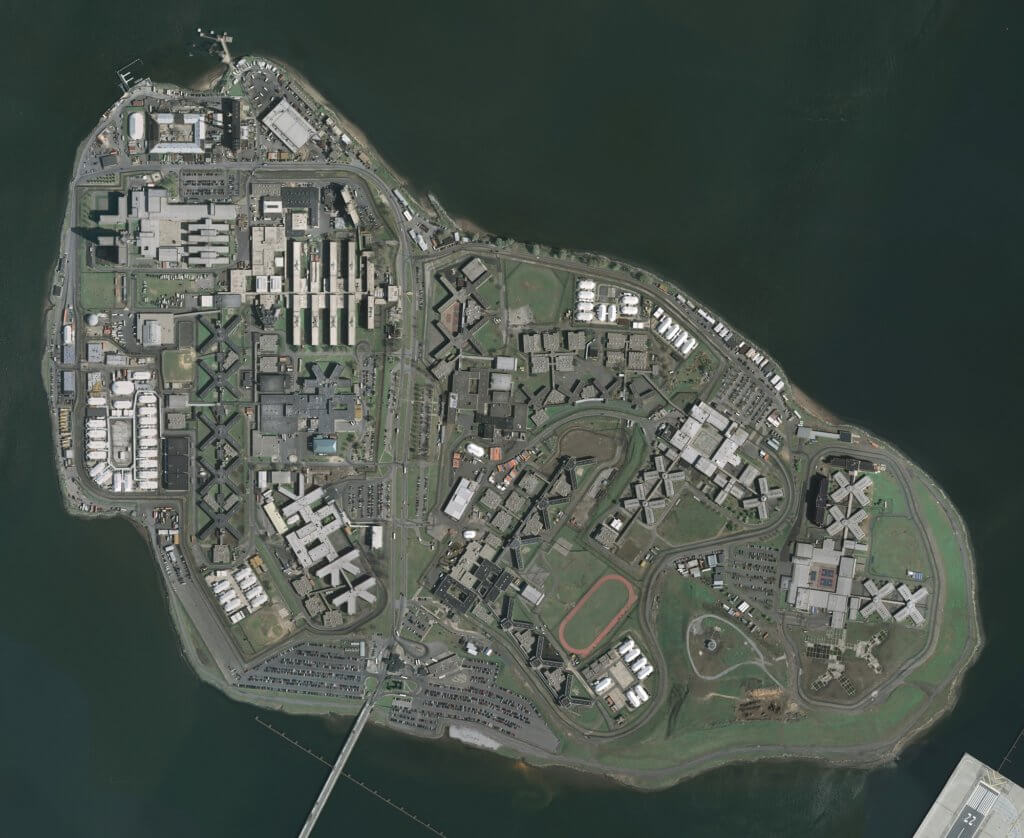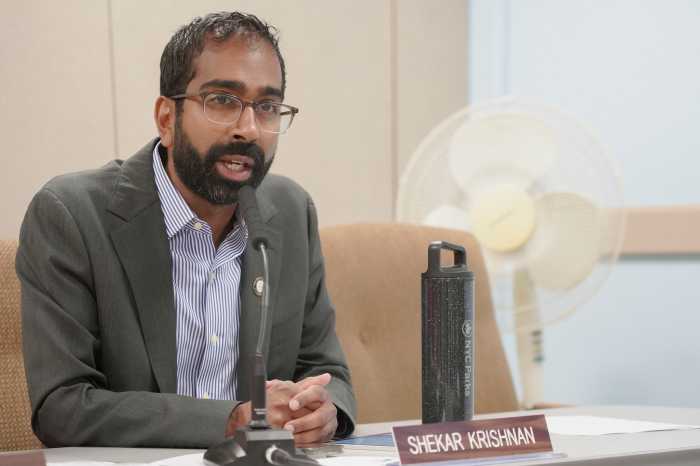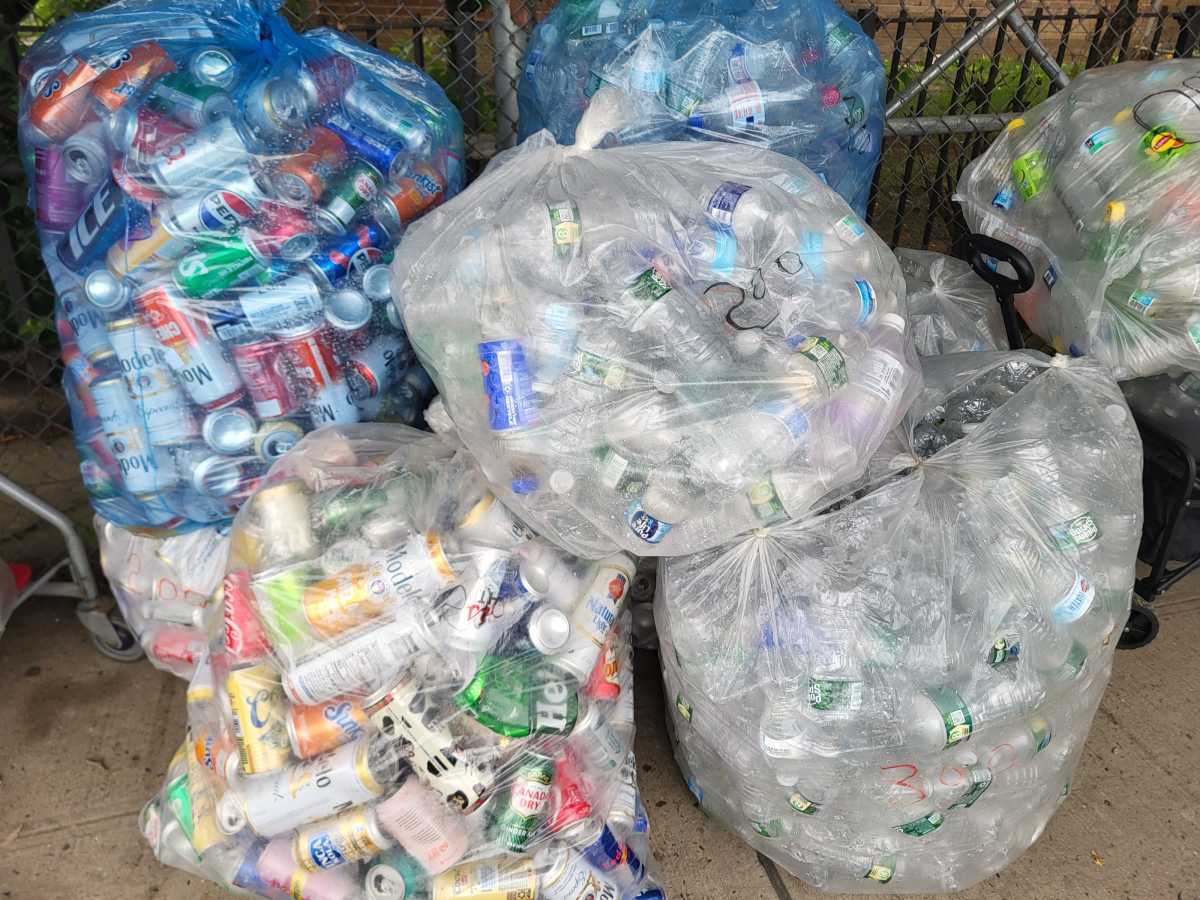Calling it a “historic and great day,” Councilman Costa Constantinides hailed the passage of his Renewable Rikers Act, a package of legislation that would transfer the land, buildings and facilities on Rikers Island from the Department of Corrections to the Department of Citywide Administrative Services.
The measures include a bill to require a feasibility study to determine whether different types of renewable energy sources, combined with battery storage, are feasible on Rikers Island.
Constantinides introduced the bills that would start the process of transforming Rikers Island into a renewable energy hub by using its land as a site for solar power and a wastewater treatment plant as a form of environmental justice.
“The 413 ares of Rikers Island have, for far too long, embodied an unjust and racist criminal justice system,” Constantinides said. “Far too many New Yorkers found themselves caught in a cycle of over-policing and over-incarceration symbolized by an island named for a family of a slave catcher. Now, however, we will have a golden opportunity to put the principles of the Green New Deal into practice with the Renewable Rikers Act. These bills will offer the city a pathway to building a hub for sustainability and resiliency that can serve as a model to cities around the world.”
According to a preliminary analysis by Sustainable CUNY, 35 acres of solar PV panels installed on Rikers Island would have a capacity of 14.6 megawatts and generate about 17.2 gigawatt hours annually. A mere 12 acres, or 4 percent of the island’s total area, meanwhile, could potentially hold 1520 megawatts worth of storage, or about one half of the goal set for the entire state by the Climate Leadership and Community Protection Act.
“Our vote today will help determine the future of Rikers Island, which has the potential to be a sustainability hub that benefits all New Yorkers,” Council Speaker Corey Johnson said. “As we transfer the land that has been a symbol of mass incarceration for far too long away from the Department of Correction, we mark another milestone in our work to close Rikers Island and imagine a more sustainable future. But we can’t allow the land to languish. This study looks at the possibilities for the land, paving the way for a greener, more just, more livable city.”
Jonathan Lippman, a former state chief judge who led the commission that crafted the plan to close the prison complex and move the population into a smaller borough-based system also promoted the transformation of the island for the public good.
“I applaud Speaker Corey Johnson, Council Member Costa Constantinides, and the City Council for answering the calls of those who have suffered at Rikers and those who demand to live in a sustainable and healthy New York City,” Lippman said. “The Renewable Rikers Act is a momentous step towards closing the jails on Rikers forever, advancing racial and criminal justice, and meeting our ambitious environmental goals – all of which are so critically important to the future of this great city.”
Before the vote in the City Council, Constantinides held a virtual rally with community activists and criminal justice reform advocates from around the city that formed a 180-organization that pushed for the closing of the prison complex on Rikers Island, known as the “Gladiator School” and “Torture Academy” during its time as “America’s last penal colony,” they said.
“On behalf of our members who survived the last penal colony in the United States commonly known as Rikers Island, Freedom Agenda would like to thank City Council for the passage of the Renewable Rikers Act,” said Darren Mack, co-director ofFreedom Agenda. “We know the violence, abuse, and toxicity of Rikers. We also know the environmental hazards in our communities. Today is a historic step in the right direction. It took courage, commitment, and work to get us to this point; it is going to take a renewal of courage, commitment, and work moving forward towards our goals.”
Former public defender and Astoria resident Tiffany Cabán, who is running to replace Constantinides on the City Council, nearly won the race for Queens district attorney in 2019 campaigning against the carceral system.
“Today we saw the City Council take the first concrete step towards transitioning Rikers Island from an epicenter of brutal injustices and racialized mass incarceration into a renewable energy facility. Climate justice is racial justice. The same communities that are over criminalized are the same ones with the worst health outcomes due to pollution and environmental hazards in their backyards. Renewable Rikers begins to address both of these interconnected disparities, at once,” Cabán said.
“In watching the Renewable Rikers bill pass the City Council today, I feel hope,” she added. “This bill opens the door to good, green union jobs for our neighbors. It calls for building infrastructure that proactively fights the climate crisis that threatens our City, as a whole, and District 22, specifically. But, I also know today’s vote was just a first step. We need leaders with the political will to make sure that Rikers Island is properly transformed from a jail to a hub of renewable energy for our city.”






































